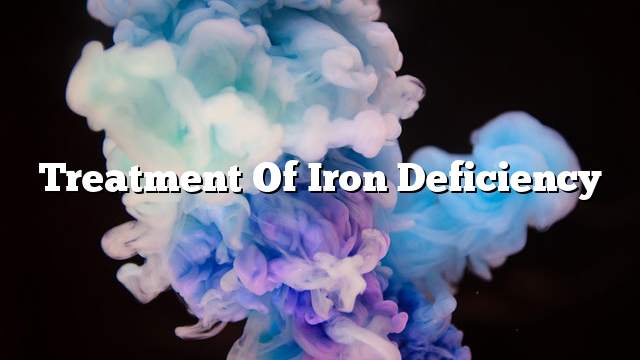Iron deficiency
Iron is an essential and essential ingredient and plays an important role in the performance of many body functions, such as the production of hemoglobin (red blood cells), the transfer of oxygen within the body, and helps the muscles to store oxygen, which is part of the enzymes, Of body reactions, iron deficiency can be defined as depletion of iron from areas where it is stored, in addition to the body’s inability to maintain the normal level of hemoglobin in the blood, which transport oxygen in the blood, causing damage to the body’s normal functions .
Reasons
- Increasing the need for iron especially in young children, who need iron more than adults, which helps them to grow, and this shortage is due to malnutrition.
- Loss of blood ratio: A person who loses a part of the blood lacks iron, especially in women because of menstruation and puerperal, because iron is found in the blood.
- Bad food habits: Most iron is obtained from food.
- Bad or upset iron absorption: This is caused by an intestinal disorder, due to celiac disease, or the removal of part of the intestine surgically, which has an effect on the ability of the intestine to absorb food containing iron.
Treatment
- Eat iron-rich foods such as red and white meat, liver, avocado, cauliflower, pepper, guava, berries, apples and leafy vegetables: spinach, watercress, mallow and parsley.
- Eat foods that help absorb iron such as citrus, guava, and vegetables such as tomatoes, carrots, eggplants and green peppers.
- Eat beans, lentils, chickpeas, beans, lentils, and other legumes. These include legumes, iron, salts and vitamins, help to resist stress caused by iron deficiency, and help produce hemoglobin.
- Eat natural supplements containing vitamin B12, which can be obtained from: eggs, dairy products, shellfish.
- Take iron tablets in the morning with pears or orange juice.
Most of the victims of iron deficiency
- Women: Women lose large amounts of blood during menstruation and after childbirth.
- Young people and infants, especially those who are underweight, during birth or born prematurely, because they need more amounts than other iron during the growth stage.
- Vegetarians: People who do not eat meat but depend on plants for their food.
- People who donate blood frequently.
